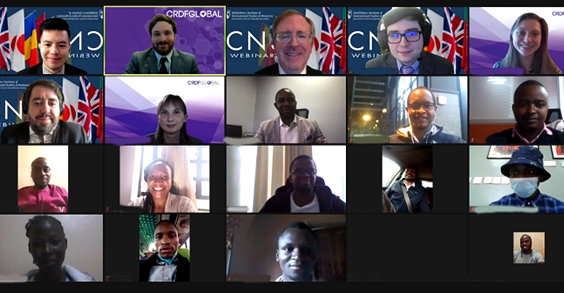December 7, 2022
Cameron Henderson
CNS over the last year completed a series of webinars for government officials and industry experts from Kenya and Nigeria on the topic of dual-use emerging technologies and the risks associated with their potential misuse for WMD development. This was achieved in coordination with our partners from CRDF Global and the Office of Cooperative Threat Reduction in the U.S. Department of State’s Bureau of International Security and Nonproliferation. The two-part webinar series was structured to first bring together representatives from both countries for sector specific sessions, followed by country specific multi-sectoral sessions. The first round of multilateral webinars took place on January 17th for industry representatives in Kenya and Nigeria, and January 24th for the countries’ government officials. The second round of bilateral webinars, which took place on June 27th and 29th, were tailored to each country and brought together industry and government representatives to discuss gaps in the national level regulatory landscapes, featuring analysis conducted and provided by local subject matter experts from Kenya and Nigeria.
Securing Innovation

The overarching framework for these events was “securing innovation,” which is a concept developed by CNS. This concept emphasizes both the desire to innovate for economic and developmental goals as well as the need to consider the risks these technologies pose. When introducing this framework to participants, CNS articulated the recognition of a few key elements of innovation: that investors and inventors must work hard to achieve innovation; that innovation is worth protecting and safeguarding; that innovation needs securing against nefarious actors that can steal or misuse innovations; and that innovation can pose security challenges and risks, but these risks can be mitigated if they are recognized and addressed.
Applying the “securing innovation” framework proved to be useful in structuring discussion around the security risks to innovation compared to the risks of innovation. The risks to innovation are those that jeopardize the technology itself, such as cybertheft, manipulative investors, and IP theft from inside and outside the organization. The risks of innovation are those that arise from the potential misuse of newly innovated technologies such as the weaponization of machine learning or genetic editing. As part of these events and to highlight these risks of innovation, CNS experts presented case studies on dual-uses associated with genetic editing, artificial intelligence, and additive manufacturing.
Experts and Leaders in Kenya and Nigeria
CNS and CRDF Global also worked with local experts in Kenya and Nigeria who undertook and presented research on what tools and mechanisms are in place in both countries to secure innovation. This approach helpfully demonstrated how a plethora of tools can be levered for the purpose of securing innovation, but also where gaps existed and why close cooperation between the government and private sector is needed. CNS saw particular value in the broad scope of controls examined by the national experts through this process and will seek to leverage this approach as a novel way of gaining insight into national implementation in other countries in the future.
Ultimately, these events brought awareness to different security challenges that innovators and governments face. As a result, government and industry leaders in Kenya and Nigeria will be better positioned to tackle these innovation risks when deciding how best to secure innovation domestically.
CNS believes that the ‘securing innovation’ concept is a useful rubric to bring together governmental and private sector actors to safeguard innovation. CNS looks forward to continuing to work with officials and industry in Kenya and Nigeria to address gaps identified by this approach. CNS also looks forward to applying this approach in additional countries.
